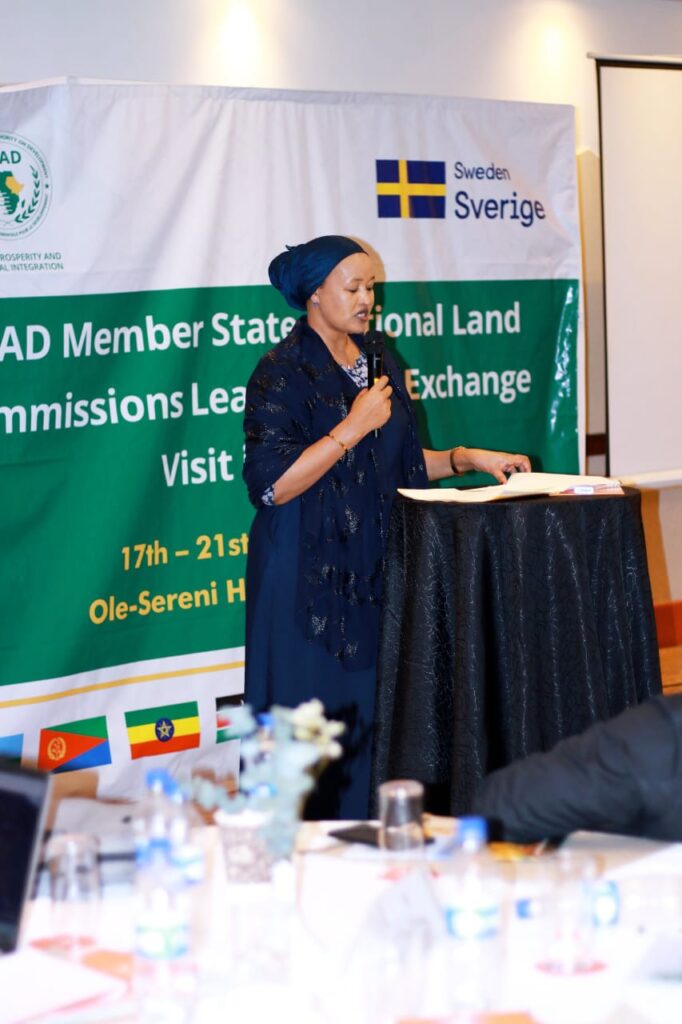
By John Kariuki
Nairobi, Kenya – The closing ceremony of the IGAD States Learning and Exchange Visit, held at Ole Sereni, marked the culmination of a highly productive and insightful engagement among representatives from various countries. The event, attended by key stakeholders in land governance, provided a unique platform for sharing best practices, exchanging knowledge, and fostering collaboration in addressing land-related challenges.
National Land Commission (NLC) CEO CHRP Kabale Tache Arero, who graced the occasion, emphasized the significance of sustaining the momentum in land reforms across the region. In her address, she urged participants to implement the lessons learned during the exchange to drive meaningful change in their respective countries. She reiterated that effective land governance is critical in ensuring equitable development and sustainable resource management, underscoring the need for continuous innovation and inclusive approaches in tackling land governance challenges.
Arero expressed profound gratitude to Sweden for its invaluable support in the development of the Community Investigation Guidelines, a framework currently underway to enhance transparency and community participation in land-related processes. She highlighted the crucial role of international partnerships in advancing land reforms and ensuring that land administration systems remain participatory, accountable, and community-centered. Sweden’s support, she noted, is instrumental in reinforcing mechanisms that empower communities to have a stronger voice in land governance, ultimately leading to fairer and more transparent processes.
She further acknowledged the African Development Bank for its continued support in strengthening land governance initiatives and called upon the institution to maintain its assistance in addressing emerging issues identified during the learning program. The insights gained from the exchange visit, she observed, have unveiled new areas requiring urgent intervention, and with sustained support from development partners, countries in the region can effectively address these challenges while enhancing policy frameworks that promote equitable access to land and sustainable land use planning.
The success of the IGAD States Learning and Exchange Visit would not have been possible without the steadfast commitment of the National Land Commission and the Ministry of Lands, Public Works, Housing, and Urban Development. Arero commended the two institutions for their leadership and coordination in ensuring the smooth execution of the program, which provided an invaluable opportunity for participants to engage in meaningful dialogue and shape the future of land administration in their respective countries. Their dedication, she noted, reflects a broader commitment to promoting collaborative efforts aimed at strengthening land governance structures at national and regional levels.
As the learning exchange came to a close, Arero reaffirmed the need for sustained cooperation, knowledge-sharing, and robust institutional support to drive land reforms forward. The discussions and experiences shared during the program have not only deepened the understanding of land governance challenges but also provided actionable insights that will shape future policies and strategies. With continued commitment from all stakeholders, the region is poised to make significant strides in ensuring fair, transparent, and inclusive land administration for sustainable development.

More Stories
Jijenge Credit Urges Senior School Parents to Seize Fast School Fees Loan Opportunity as First Term Continues
Kimani wa Makaratasi: From Grass to Grace, Turning Paper into Possibility
Statement from KENAPCO Chairperson Dr Ekrah Ndungu on KCSE Results